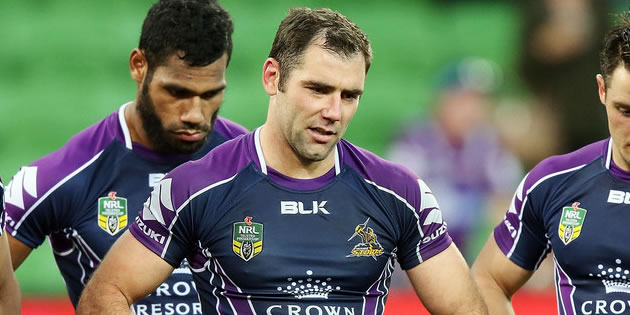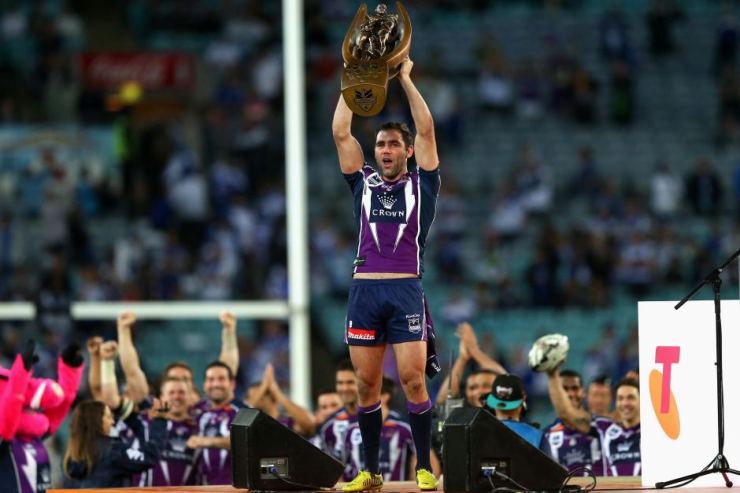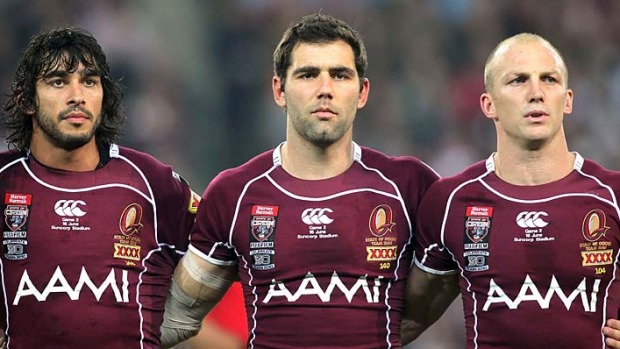
In some ways, Cameron Smith is more difficult to pin down than Billy Slater or Cooper Cronk. Although he often seems like the most transparent of the three – their public face – he’s more indiscernible, in his own way, than either Slater or Cronk. In part that’s because he somehow seems to contain the other two players in his presence, not just because he’s been with the Storm the longest, or because he’s managed to find the perfect middle ground between Slater’s extroversion and Cronk’s inscrutability, but because there seems to be a tacit acknowledgment on the part of the trio – or at least a tacit suggestion to the way the media frames them – that Smith is their leader and mentor, which often makes it feel as if he’s as much a part of the Storm coaching staff as the Storm itself. Certainly, his captaincy duties for the Storm and the Maroons tend to coalesce around the ways in which he has managed to captain Cronk and Slater in turn, as if the key to skippering these two great teams lay in knowing how to orchestrate the threesome that still remains their most valuable asset.

In fact, Smith is really the NRL’s captain par excellence. Not only has he cemented the Maroons as arguably the single most successful team in any Rugby League tournament over the last decade, but the fact that he has been with the Storm almost since its inception provides him with a unique authority and authenticity as captain. As I mentioned in my previous post on Cronk, it’s a bit weird to think of those first couple of years at Melbourne before Smith came along, just as there’s something of an imminent identity crisis facing the Storm now that Smith’s retirement has started to come onto the horizon. After all, the team has only really had two phases – the initial couple of years, when it was finding its feet, and the Smith-Slater-Cronk era, which ushered in a decade of greatness so suddenly that the trio almost seemed mythological from the moment they first played together in 2004.

A couple of days, ago, NRL.com published an article on the great Rugby League generation of 2004. Looking back upon that year, it’s clear that there were three great clubs in the making – the Bulldogs, the Sea Eagles and the Storm – but it’s only Melbourne that have managed to steadily make good on that promise, with the Canterbury-Bankstown outfit of the early 00s dissolving almost as soon as it began and Manly-Warringah going in the other direction, sticking it out with nearly the same longevity and determination as the Storm only to bow to market forces over the last couple of years. Think how the Sea Eagles would feel now – or in a couple of years – if Foran, Watmough and Glenn Stewart were still there, and you get a sense of why it is that the sight of Smith, Slater and Cronk still playing for Melbourne tends to get fans a bit teary. In fact, the comparison with Manly clarifies that part of what makes the Storm so successful has been the way that they have been able to manage their assets – or at least their key assets – over the last decade, which is what made the salary cap breach so shocking but also what allowed Melbourne to bounce back better than you might have expected from any other team. More and more, that managerial aplomb feels continuous with Smith’s managerial presence, which is perhaps why he felt like the Storm’s captain long before he officially took up the role.

In other words, there’s no captain in the NRL who’s quite like Smith. Robbie Farah probably comes closest, due to his longevity and identification with the Tigers, his captaincy for the Blues, and his position at hooker. In fact, you could say that Robbie is a bit like Smith’s doppelganger, a captain who’s managed to forge a connection between NRL and Origin underdogs just as Smith has managed to forge a connection between NRL and Origin superheroes. People are pretty quick to knock Farah, but setting him alongside Smith clarifies just how tough his job has been over the last couple of years. You have to wonder whether Smith would be so serene or assured with both the Tigers and the Blues to contend with. Still, the special status of the Maroons-Melbourne crossover, as well as Smith’s peculiar identification with the Storm, outdoes even Farah’s gravity and authority amongst the NRL’s key captains.

One of the reasons people love Smith, then, has to be because his captaincy for both the Storm and the Maroons hearkens back to an older and more stable version of Rugby League, when players were more consistently affiliated with teams than they are now. Similarly, one of the reasons I think people love Origin is the way it still offers some outlet for this sense of consistency. As much as regular teams might trade players year in and year out, and as much as players might renege on contracts year in and year out, it’s part of the very premise of Origin that you can’t trade in and out of your team, which explains why such outrage mounts around the few loopholes that do occur, most notoriously Greg Inglis’ decision to play for Queensland despite having played his first match in Kempsie. Similarly, the push to open up Origin to New Zealand and the Pacific also taps into these anxieties, since while there is undoubtedly a certain racism to the backlash that has ensued, there also seems to be a more general anxiety that opening up Origin in this way will bring it closer to the deregulated fluidity of the NRL at large. After all, where else in the game can you see players who have been compelled to stick with the same outfit their entire careers? In the alternative universe that is Origin, every player is a one-team player and every player aspires to be a one-team player, which is perhaps why Origin seems to momentarily redeem the flightiest players – Blake Ferguson, Nate Myles, Greg Bird – and give them a new focus and purpose.

It’s not hard to see, then, why the Maroons-Melbourne connection is so precious to NRL fans, since the Storm is pretty much the only place outside of Origin where this Origin fantasy still holds. Watching the Storm at their strongest – and watching Smith, Slater and Cronk in particular – is a bit like seeing the fantasy of Origin coming to life on the regular footy field. As a result, Storm games tend to have an Origin-like breathlessness about them, just as there’s always a sense of Origin-in-miniature whenever the Storm take on the Tigers, making it a fairly natural step for the NRL to designate a certain proportion of Origin games to AAMI Park, since it’s already something of an Origin venue anyway. If the pleasure of watching Origin is in seeing the same players turn up year after year – with a few exceptions – then part of the pleasure of watching the Storm lies in the sheer incredulity that Melbourne have somehow managed to keep these players in their stable despite all financial pressure to the contrary. On top of that player consistency, the Maroons have also had a much more stable roster of captains than the Blues, with Smith pretty much skippering the team from 2012 onwards and inheriting Darren Lockyer’s mantle to become the third longest-serving Queensland captain after Locky and Wally Lewis, as well as arguably the most decorated Queensland captain in the way he has cemented the legacy of this greatest of all Origin outfits, culminating with his extraordinary performance in last year’s Origin decider.

By contrast, the Blues haven’t had that kind of captaincy consistency since 2008, with Danny Buderus culminating a string of long-term captains that also included Brad Fittler, Laurie Daley and Andrew Johns. Sure, Johns only captained six games, but they were six consecutive games, and in Origin that counts for a lot, while his utter supremacy in the game in the early 00s meant that he didn’t need a particularly long stint to make his leadership mark. Similarly, while Geoff Toovey may have only put in an intern captaincy in 1998, his contribution also feels like a critical part of the Blues’ legacy, since there’s a certain power in seeing such an NRL icon helming an entire season of Origin. Since Buderus stepped down as captain, however, the Blues have lost their leadership vision, with four captains since 2010, and a couple of years when the captaincy hasn’t even been consistent throughout the season, something that has never occurred in the recent Maroons outfit. For a sporting event that’s as condensed and focused as Origin, that’s a big deal, and it’s no coincidence that the Blues scored their first victory in nearly a decade in one of the years when captaincy was consistent. Add Laurie Daley’s tendency to mix his team up more than Mal Meninga and it often feels as if the flux and fluidity that Origin keeps at bay – the flux and fluidity of a deregulated, twenty-first century NRL – is embodied by the Blues themselves, which is perhaps what has allowed Queensland to develop such a staunch fortress mentality, as well as why the Blues often seem like the worst combination of what’s most old-fashioned and cutting-edge about the game.

As a result, it can sometimes feel as if Smith is one of those players who stand between the game and its worst tendencies, which has tended to turn him into something of an ambassador for the game at large, as well as an icon in both Melbourne and Queensland. Of course, to Blues fans, that fandom can sometimes seem to spell an apocalyptic NRL future that is not NSW-centric, but even New South Wales fans seem to have more time for Smith than for virtually any other member of the Queensland side, with the exception of Thurston. In part, that’s because Smith has also captained the Kangaroos on the international stage, but I think there’s also something about the fact that Smith plays at hooker that tends to cut against any excessive grandiosity as well. Traditionally, it’s the halves and fullbacks who are the prestige players – and personality players – partly because these are two of the positions that arguably require the greatest fusion of cognitive and physical skill. Yet, over his career, Smith has arguably elevated the role of hooker to a similar prestige status, while not losing the sense of being in a bit of an underdog position as well. Where halves and backs – hopefully – stand out like top-billed actors in pretty much every game in which they represent their team, hookers tend to be facilitators, subsuming themselves into the texture of their team in ways that don’t generally allow for the same degree of flashy play. And yet, while Smith may often feel less visible, prestigious or personality-driven on the field, the genius of his hooker mentality lies in the way he uses that invisibility to his advantage, converging it with his captaincy and management smarts in a quite brilliant and innovative manner.

Put simply, Smith treats his position at hooker as something of a paradox, allowing him to come across as one of the most self-effacing and gentlemanly of NRL players, but also as one of the most brutal and plosive. If part of the art of Rugby League is the ability to conceal or contain this brutality within the parameters of good sportsmanship – or to stretch those parameters just enough to accommodate it – then Smith is one of the most artful platers out there, gifted with an invisible, weightless touch that often makes it feel as if he’s occupying every part of the field, or playing every possible position, at the same time. Even Farah’s dynamic vision as a hooker-turned-captain can’t match Smith for this kind of effortless, almost magical, dexterity.

While that elevation of hooker to the status of halfback and fullback has marked Smith’s entire career – there’s barely a year he hasn’t taken home something at the Dally M awards – it arguably came to a head with a pair of International Rugby League Federation awards in 2011 and 2012 for Hooker of the Year and Player of the Year respectively. On the one hand, the succession of these awards was definite proof that a hooker can be the best player in the world as much as a halfback or fullback. At the same time, there was something particularly spectacular about Smith’s appearance at the Tower of London to receive the 2011 award for Best Hooker, a confirmation that this traditionally “lowlier” position had finally entered the realm of Rugby League royalty, or at least entered it in a more emphatic manner than ever before. Add to that the fact that Smith has shown himself to be more than capable of playing at halfback – both in his earliest days at Melbourne and as a replacement for Cronk in the 2010 World Cup Challenge – and his dedication to hooker seems even more remarkable and distinct.

Despite being such a powerhouse player, you’d assume that Smith’s career might have started to diminish ten years down the track, but two of his greatest achievements have occurred in the last eighteen months. In 2014, he became the first player in Origin history to win 20 games, taking the edge off the Blues’ victory in the same year with the smashing third game of the season. While New South Wales may have won the series, Smith was the real victor, which made it feel as if the Queensland dynasty had continued more or less unbroken. Flash-forward to 2015, where Smith put in arguably the single greatest Origin performance of his career in Game 3, leading the Maroons to a smashing 52-6 victory that seemed to cement every Queensland achievement of the last decade and almost making it feel as if they could keep it up for another ten years, with Smith sliding seamlessly from captain to coach.

As some commentators observed, Smith’s performance was all the more incredible in that he’d just come off the back of the Four Corners scandal. While there’s certainly a case to be made to the effect that he should have been consulted for that broadcast, I must say that, despite all my admiration for Smith as a player and captain, I really think that he has behaved quite dreadfully towards Alex McKinnon. Of course, I don’t know all the details, but I have some pretty strong opinions about it, as well as what Smith owes to the game, to himself and – above all – to McKinnon. At the same time, I don’t want to turn McKinnon’s story into a mere footnote to Smith’s, and until I feel I have something to write that is commensurate to McKinnon’s dignity, I’d prefer to leave it. Suffice to say that McKinnon is the Rugby League hero par excellence, and a testament to the power of courage in the face of adversity, and hopefully Smith will cement his incredible legacy by finally coming good on this one as well.